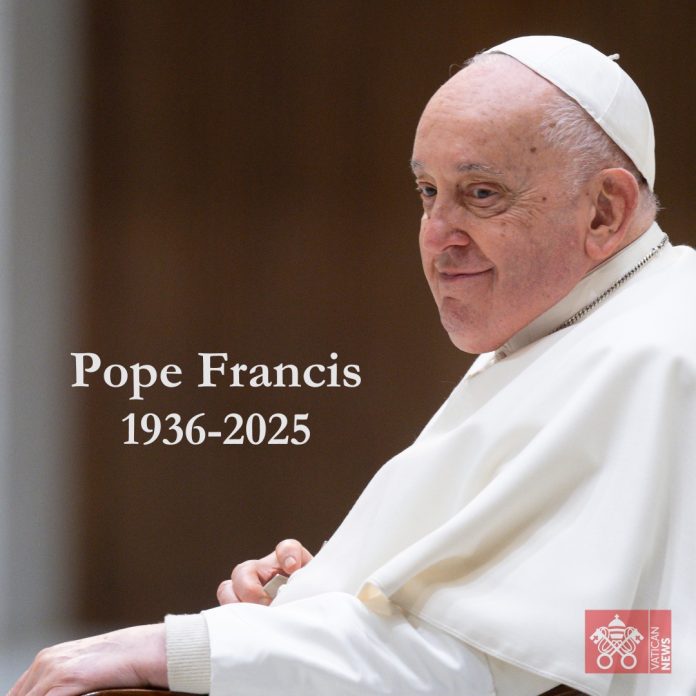Pope Francis, born Jorge Mario Bergoglio on December 17, 1936, in Buenos Aires, Argentina, served as the 266th pope of the Roman Catholic Church and was one of the most transformative leaders of the modern era. His journey from the streets of Argentina to the throne of St. Peter was marked by humility, deep pastoral care, and a groundbreaking vision for a more inclusive and compassionate Church. His papacy ended with his death on April 21, 2025, at the age of 88.
Early Life and Education
Born to Italian immigrants, Jorge Mario Bergoglio grew up in a working-class family in Buenos Aires. He was the eldest of five children, raised in a deeply Catholic home. Before answering his call to the priesthood, he trained as a chemical technician and briefly worked in a laboratory.
At the age of 21, after a serious illness led him to reflect on his life’s purpose, he entered the seminary and joined the Society of Jesus (Jesuits) in 1958. He was ordained a priest in 1969, marking the beginning of a lifetime of service.
Jesuit Leadership and Archbishop of Buenos Aires
As a Jesuit, Bergoglio taught literature, psychology, philosophy, and theology. He quickly rose through the ranks, becoming Provincial Superior of the Jesuits in Argentina from 1973 to 1979. Known for his intellect and spiritual depth, he promoted a simpler, humbler lifestyle, in stark contrast to the often hierarchical and privileged image of Church leadership.
Pope Francis: My message to Kenyans
In 1992, he was appointed auxiliary bishop of Buenos Aires, and by 1998, he became Archbishop. In 2001, Pope John Paul II made him a cardinal. In Buenos Aires, Bergoglio was known as a “bishop of the slums.” He refused to live in the archbishop’s palace, took public transport, and cooked his own meals. He prioritized the needs of the poor and marginalized, emphasizing mercy over judgment.
The Historic Papacy (2013–2025)
Following the surprising resignation of Pope Benedict XVI, Cardinal Bergoglio was elected pope on March 13, 2013, becoming the first pope from Latin America, the first Jesuit pope, and the first non-European in over 1,200 years. He chose the name Francis, inspired by St. Francis of Assisi, reflecting a commitment to peace, humility, and care for the poor and creation.
Key Themes of His Papacy:
1. Mercy and Compassion
Francis emphasized a more pastoral Church, focused on mercy, forgiveness, and welcoming the excluded. His 2015 Jubilee Year of Mercy and his famous remark, “Who am I to judge?” about gay individuals seeking God, captured his tone of inclusivity.
Pope Francis slows down in Nairobi for elderly lady to touch him
2. Social Justice
He consistently advocated for the poor, refugees, and victims of economic inequality. His encyclical Fratelli Tutti called for global solidarity, dialogue, and an end to populist nationalism and xenophobia.
3. Care for the Environment
In 2015, Francis released Laudato Si’, an encyclical on ecology and climate change, which became a rallying cry for environmental activism and a call for moral responsibility toward creation.
4. Church Reform and Synodality
Francis sought to decentralize Church governance and promote synodality—a model of listening and shared leadership. His efforts to reform the Roman Curia and increase lay and female participation in Church leadership were among his hallmark initiatives.
5. Interfaith Dialogue
He deepened relationships with Muslims, Jews, and other faith communities, notably signing the Document on Human Fraternity with the Grand Imam of Al-Azhar in 2019, a milestone in Christian-Muslim relations.
Health, Later Years, and Final Days
In the later years of his papacy, Pope Francis faced multiple health challenges, including surgery for colon issues in 2021 and repeated respiratory infections. Despite these challenges, he remained active in global diplomacy, social justice advocacy, and theological reflection.
Pope Francis: I know of private developers who grab school playgrounds
His final public appearance was on Easter Sunday, April 20, 2025, from the balcony of St. Peter’s Basilica, where he delivered a blessing and met visiting dignitaries. He died the following day, April 21, 2025, at his residence in the Casa Santa Marta in the Vatican, surrounded by close aides. The Vatican declared nine days of mourning as preparations began for the conclave to elect his successor.
Legacy
Pope Francis leaves behind a Church forever changed by his leadership. He brought the papacy closer to the people, championed a message of love and inclusion, and reminded the world that faith must walk hand in hand with justice, mercy, and compassion.
He will be remembered not only as a spiritual leader but also as a global moral voice in an era marked by division and crisis.










